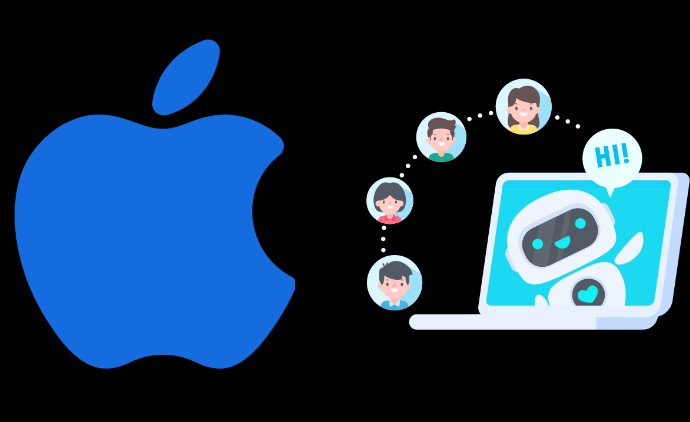In a bold strategic move, tech giant Apple has been silently embarking on an ambitious Artificial Intelligence (AI) endeavor that could potentially disrupt the AI landscape and give fierce competition to industry giants like OpenAI and Google.
While Apple has been incorporating AI into various aspects of its business, including Siri and autocorrect, this latest development showcases its determination to compete with other popular large language models (LLM) that have captivated both the imaginations and fears of consumers worldwide.
Initially designed for internal use, Apple’s chatbot had its rollout suspended last year due to security concerns, as highlighted by Bloomberg. Despite this setback, Apple’s workforce is not permitted to develop customer-oriented features based on the chatbot’s output. Instead, they utilize it primarily for product prototyping. This Artificial Intelligence creation emulates the features of ChatGPT and Google’s Bard, but the company has no plans to release it to the public.
The moment Bloomberg News reported Apple’s contemplation of a consumer-friendly Artificial Intelligence competitor to OpenAI’s ChatGPT and Google’s Bard, the company’s market cap experienced an astounding surge of $67 billion. Share prices skyrocketed, climbing by $3.80 per share, exceeding $197, as per FactSet data.
However, some traders seized the opportunity to sell, causing a slight dip in the stock price, amounting to approximately $2.67 per share at press time. Despite this, the stock still boasted a respectable 0.71% increase on the day.
With a market cap of around $3.06 trillion and Apple’s stock (APPL) trading at approximately $195 a share at 4:30 pm ET on July 19, the substantial price surge illustrates investors’ confidence in the potential earnings from generative AI, which encompasses large language models.
Apple AI Chatbot in the making
The enthusiasm may also have been tempered by the realization that Apple’s chatbot will remain an internal tool, exclusively developed for the company’s use. As of now, the idea of introducing a generative AI for consumers is only under consideration.
Apple’s not the only company to witness a stock price rise upon announcing new integrations with AI tools; Microsoft and Buzzfeed have experienced similar trends. However, it remains to be seen how these generative AI integrations will manifest in companies’ earnings reports.
In keeping with the trend, Samsung too developed an internal chatbot after banning its staff from using ChatGPT due to the discovery of a data leak.
Interestingly, Apple is currently conducting a corporate trial of OpenAI’s technology and appears to be contemplating a potential partnership with the Artificial Intelligence giant, as revealed by Bloomberg. Publicly, Apple’s CEO, Tim Cook, has expressed concerns about LLMs introducing bias and misinformation, advocating for proper regulation.
Apple Inc., renowned for its iconic iPhone, has thus far been discreetly nurturing the concept of AppleGPT, a groundbreaking Artificial Intelligence venture that could redefine the AI landscape and take the company’s technological prowess to unparalleled heights. While Apple’s Siri voice assistant has enjoyed widespread popularity, its AI efforts have been relatively subdued in recent years.
However, with the advent of AppleGPT, the tech titan is positioning itself as a formidable player in the rapidly evolving world of Artificial Intelligence. As the company’s plans unfold, the tech and business community eagerly anticipates the potential impact of AppleGPT on the AI landscape and beyond.
Renowned for its innovative stance, Apple has consistently strived to differentiate itself from its competitors. During the company’s developer conference in June, Apple’s executives noticeably refrained from using the term “artificial intelligence,” opting instead to create their unique aura of excitement rather than simply following existing hype.
However, this doesn’t imply that Apple shies away from employing Artificial Intelligence technology. On the contrary, it harnesses the power of machine learning, a subset of the broader Artificial Intelligence domain, to fuel its latest groundbreaking product, the spatial computing Vision Pro. Brimming with cutting-edge machine-learning capabilities, the Vision Pro promises a mesmerizing experience.
But the magic of machine learning doesn’t end there. Apple’s iPhones, too, are enriched with sophisticated machine-learning algorithms that optimize various functionalities. From the secure Face ID authentication to intelligent battery usage data, personalized photo organization, smart keyboard suggestions, and precision-driven maps, machine learning permeates every aspect of the user experience.
Apple continues to carve its path in the tech industry, pushing the boundaries with its distinctive blend of spatial computing and machine learning. As the company forges ahead, its unique approach promises to captivate and delight users, setting new benchmarks in the ever-evolving world of technology.






